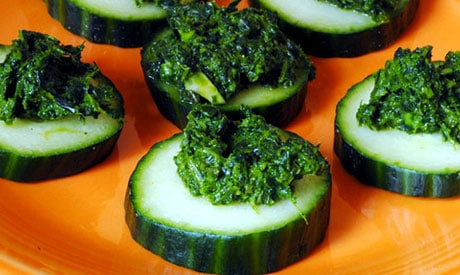
It’s hard to believe that there was ever a time before pesto in the U.S., but it’s true. Prior to the 1980s culinary revolution in the States – the dark age before fresh pasta and triple-cream cheese were commonly on the table – pesto was mostly known only on the other side of the Atlantic. How did we survive?
Some of pesto’s trendy cohorts of the 1980s didn’t have much perseverance, but while we’ve relegated power suits and Flashdance sweatshirts to the back of the closet, pesto, thankfully, has endured. The problem is that many home cooks have fallen into the basil-pine-nut rut, and while this classic Genoese version will remain an exquisite combination of flavors until the end of days, it can get a bit boring.
With that in mind, switching it up whenever you can is simple and deeply satisfying – especially now that spring is here with its ample supply of tender new greens, proffering flavors we’ve been denied all winter. The basic structure or green-nuts-oil-cheese is so perfectly magic that it responds beautifully to all kinds of tinkering.
The proportions of basic pesto look roughly like this:
2 cups packed green leafy things
1-2 cloves garlic
1/4 cup nuts
1/4 cup olive oil
¼ cup cheese
Salt and pepper
Combine the greens, garlic, and nuts in a food processor and pulse until coarsely chopped. Add the oil and process until fully incorporated and smooth, add cheese, season with salt and pepper to taste. Eat.
Here’s how to mix it up:
1. Relinquish the basil
Basil is lovely; everyone adores basil and it’s easy to find in most markets. But if it is delivering you to a place of herbal monotony, know that pesto plays nicely with other herbs as well. Ones that work wonders include cilantro, dill, parsley, and mint – use them alone, or go wacky and blend several together. Hearty herbs like rosemary or fresh oregano can be used, but be prepared for a very strong flavor.
2. Include other vegetables
Many leafy greens that don’t fall into the herb category can be used in place of basil as well. Spinach, arugula, and kale add a deep green flavor that isn’t is as bright as the one from herbs, but is wonderful in its own right. If you are lucky enough to have access to ramps (aka spring onions or wild garlic), use them – but skip more regular garlic unless you’re very brave. Sautéed leeks can be blitzed into a passable pesto too. Last but not least, you can add other vegetables to fill out the measurement of herbs: green peas with mint; raw zucchini with basil; and roasted peppers with cilantro are just some ideas. Use your imagination. You’re mixing these things with garlic, oil, nuts, and cheese; it’s kind of hard to go wrong.
3. Swap the nuts
Pine nuts are the go-to nut for pesto; and as rich, delicate, and sweet as they may be, they cost a not-so-small fortune. Cashews have a creamy texture and can be used instead. Almonds impart a wonderful flavor. Walnuts’ deep nuttiness pairs nicely with parsley. You can try peanuts, although some find them too …peanutty. Sunflower seeds work, as do hemp seeds and hazelnuts; iron-packed pumpkin seeds? Yes. Are you getting the idea here? Whatever nuts you’ve got on hand, give them a spin.
4. Employ new oils
Olive oil is the granddaddy of pasta oils, it’s true, but that doesn’t mean other oils don’t stand a good chance of transforming your pesto. Often we have specialty oils in our pantries that go neglected until they die an ignominious and rancid death. Use them up! Hemp oil adds a buttery nuttiness that is sublime, as do other nut oils, squash seed oils, and avocado oil.
5. Add weird items
Okay, maybe not weird-weird, but thinking outside of the box can excite even the most indifferent of pesto eaters. A smoky roasted jalapeno in collaboration with the bright notes of the greens equates to instant enhancement. (Roast jalapenos on a gas burner or under the broiler as you would a regular roasted bell pepper; and please don’t rub your eyes or other sensitive body parts before washing your hands.) Lemon zest brightens, preserved lemons bring zing, anchovies pump up the umami, sun-dried tomatoes impart a punch of savory, olives add a salty kapow, and capers give a briny kick. Basically, open your fridge or pantry, see what’s wallowing away, and throw it in.
The gist of it is this: mix and match. Pesto may be one of the most forgiving sauces known to mankind and responds terrifically to improvisation. By including other items, you get to expand your pesto repertory while also getting rid of leftover bits of this and that. And lastly, variety is the key to getting the best array of nutrients; by sneaking new things into the mix, both the mouth and the body will rejoice.
Photo Credit: Elana's Pantry










